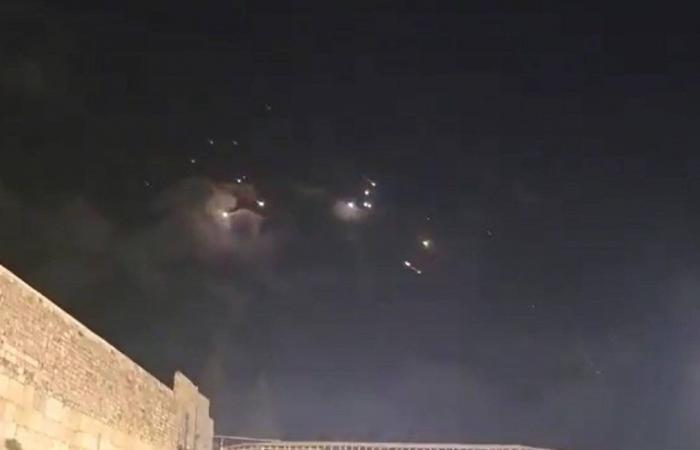The attack was expected, even hoped for, by Iran’s regional allies. A shower of some 200 missiles fired by Tehran collided with the Israeli anti-aircraft defense system on Tuesday evening. The United States had warned its partner of the imminence of this attack, clearly aware of the Iranian project. If Iran denies having confided its intentions to Washington, the Reuters agency maintains that the Islamic Republic had at least warned Russia.
Obviously aware, the Israeli authorities were able to intercept, with American and French help, “the majority of incoming missiles”, according to the Pentagon, deploring “minimal damage to the ground”. Why did Iran announce its air offensive, as had already been the case in April?
Saving face without declaring war
“The Iranian authorities have sent a message, particularly to the United States,” analyzes Pierre Razoux, academic director of the Mediterranean Foundation for Strategic Studies (FMES) and author of IDF – New History of the Israeli Army (Perrin). Tehran finally chose to respond to the death of the leader of Hezbollah and the leader of Hamas, but also of an Iranian general killed in Beirut, in a spectacular but not deadly strike, which made it possible to avoid an uncontrollable escalation between Israel and Iran” and to reduce the impact of the aggression.
Among other words, after having had their credibility damaged, it was a matter of saving face and “restoring a certain conventional minimum deterrence while showing that the supreme guide was still in charge of affairs,” adds Pierre Razoux.
This Wednesday, there was no response the next day “we are therefore not in a campaign of daily strikes”, underlines Michel Goya, former colonel of the marine troops, historian, strategist and author of The Catching Fire – Understanding the stakes of the Israel-Hamas War (Perrin – Robert Laffont).
Warn neighboring countries
Compared to the response launched last April against Israel, Iran has nevertheless gone up a notch by firing twice as many missiles, according to Washington and above all by using more ballistic missiles, which are faster and therefore less easy to attack. intercept only drones. “So it’s a small escalation but above all a demonstration strike,” summarizes Michel Goya. Thus, by choosing ballistic missiles, Iran was able to “preserve tactical surprise”, adds the specialist.
The other reason for this upstream warning is quite simply the geography of the region. Between Iran and Israel, there is almost 1,000 kilometers of distance. Missiles launched from the territory of the Islamic Republic necessarily cross the skies of other countries such as Iraq or Jordan at the risk of “misinterpretation by neighboring countries which could trigger their radars”, points out Michel Goya. It is then a question of avoiding an instant response caused by a misunderstanding.
A considerable risk for the Islamic Republic of Iran
From now on, the Middle East is awaiting an Israeli response, despite numerous calls for restraint within the international community. It remains to be seen whether, as in April, Iran will leave it at that or whether it will retaliate again, which would potentially plunge the region into open war between the two enemy countries. “The dilemma for Israel and the United States is that a too violent response could push the Iranian regime to cross the threshold of military nuclear capability to deter any new attack on Iranian territory,” emphasizes Pierre Razoux. .
Our file on tensions in the Middle East
But does Iran have the means to stand up to Israel in the long term? This latest attack was not really a deterrent for the government of Benyamin Netanyahu, which can on the contrary seize the stick extended by Iran. And even if Tehran undoubtedly has “the capabilities to strike further and harder”, according to Pierre Razoux, “this offensive gives Israel the opportunity and the excuse to attack with force, which is dangerous for the regime of the Islamic Republic. “It’s a big risk that Iran took,” says Michel Goya.






